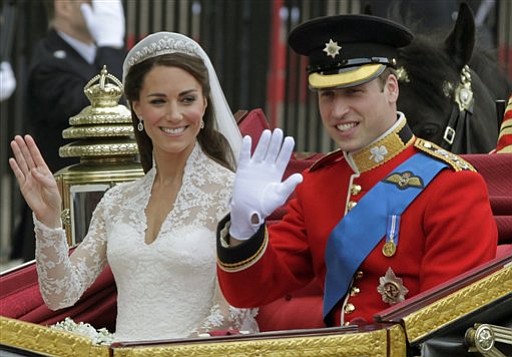LONDON — If Will and Kate’s first child is a girl, it’s now clear that she’ll probably become queen one day — and not even getting a little brother can mess that up.
The Commonwealth countries agreed Friday to change centuries-old rules of succession that put sons on the throne ahead of any older sisters. So that hypothetical daughter of Prince William and Kate Middleton — now known as Catherine, Duchess of Cambridge — would have a prime place in history: the first princess to beat out any younger brothers and accede to the throne.
Had these rules been in place in the 1500s, Henry VIII might have been just a rather large historical footnote.
The move is a baby step: Before taking effect, the changes still must be approved by the legislatures of the 16 nations where Queen Elizabeth II is head of state. Still, the agreement, which was reached at a meeting of Commonwealth nations in Perth, Australia, represents a triumph over practices now considered outdated and sexist in much of the world.
Nations including Sweden, Belgium, the Netherlands and Norway have already taken similar steps.
Also on Friday, the Commonwealth agreed to lift a ban on monarchs marrying Roman Catholics. Critics had called the rule blatantly discriminatory since royals are free to wed Jews, Muslims, Hindus or members of any other religion.
Will and Kate’s lavish April wedding renewed a decades-long debate over succession.
Once their honeymoon was over, baby talk started, adding urgency to the dialogue, although officials insist that talk of a pregnancy is premature.
Historians think it’s about time.
“You shouldn’t muck around too much with the constitution, but it’s a good idea to change this at this time,” said royal expert Hugo Vickers. “It’s much better to have it sorted out before any babies come along.”
The new rules would only apply to future heirs and would have no impact on the current line of succession.
William is second in line to the throne after his father, Prince Charles, who is the queen’s firstborn child.
The rule has kept women from succeeding to the throne in the past. Queen Victoria’s first child was a daughter — also called Victoria — but it was her younger brother who became King Edward VII.
If Queen Victoria had been able to pass her crown to her firstborn, Britain’s Princess Victoria would have had a brief reign before her death in 1901.
That would have made her son — Wilhelm II, who at that time was the German Kaiser — king. With Wilhelm II ruling both Germany and Britain, there may not have been two world wars.
Earlier history might also have been drastically different if women had had equal rights to the throne.
Neither Henry VIII nor Charles I would have been king because both had older sisters who, under the new rules, would have succeeded to the throne.
As king, Henry VIII set in motion the creation of the Church of England. His six marriages left an insecure succession — one sickly son and two princesses.
Charles I’s reign in the 17th century led to a bloody civil war.
Prince William and his wife have been credited with freshening up a staid monarchy, and new succession rules seem to fit right in.
“In this day and age, why should a royal son be more important than a royal daughter?” said Joe Little, managing editor of Majesty magazine.



